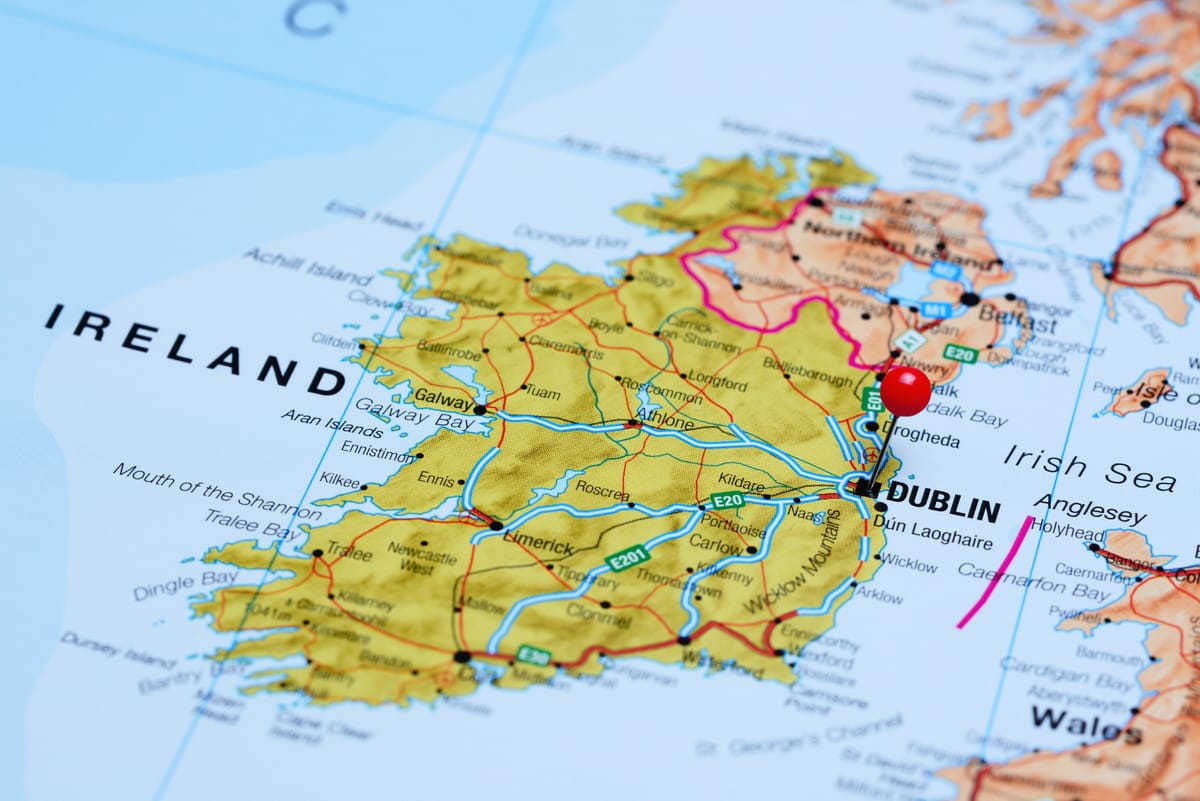How to Navigate Airbnb Rules in Ireland

So you're thinking of setting up on the Emerald Isle? I can't blame you. Ireland has long drawn travelers from around the globe. From the Cliffs of Moher to the streets of Dublin, it's a prime destination. But while it’s easy to fall for the charm, hosting here comes with rules you need to know.
Platforms like Airbnb have opened up income opportunities for homeowners and investors alike, but hosting isn't as simple as handing over the keys and stocking up on teabags.
Whether you're letting a spare room in your house or managing a holiday property full-time, it's essential to understand and follow Ireland’s rules around short-term letting. Non-compliance can lead to serious consequences, from fines and delistings to legal trouble, especially as regulations tighten in popular areas.
This guide breaks down the key requirements, answers the most common questions, and helps you navigate the ever-evolving landscape of Airbnb rules and short-term rental regulations in Ireland.
What Are the Rules for Airbnb in Ireland?
If you're thinking about dipping your toes into the short-term rental market in Ireland, there are a few legal hoops to jump through, and they’re not just small, decorative ones. Short-term rental hosts on Airbnb or similar platforms are essentially running a short-term rental business, and that comes with responsibilities.
Let’s break down the basics.
What counts as a short-term let?
In Ireland, a short-term letting is defined as renting out a property for short-term stays of less than 14 consecutive nights (some rules use 21 nights as a threshold, depending on the context). This includes everything from spare bedrooms in your principal private residence to entire apartments in major cities.
It’s important to know whether your property qualifies as:
- A room in your own home (aka “rent a room” style)
- An entire property that you let out independently
Why does this matter? Because the rules are different depending on what and how you're renting.
Renting a room in your home
Suppose you live in the home and you’re just letting out a spare room. In that case, you can often operate with fewer restrictions, especially if you qualify under the Rent a Room Scheme, which also comes with some rental income tax relief if you're below the annual income threshold.
However, you still need to register with Fáilte Ireland’s Short-Term Tourist Letting Register, and follow basic safety, insurance, and tax obligations.
Renting a property
Renting out a full property (whether it’s your entire principal private residence or a second home) has stricter rules, particularly in Rent Pressure Zones (RPZs) like Dublin City Council or Galway. You may need to apply for planning permission, especially if you’re offering it for more than 90 days in a calendar year. There is a planning permission requirement for such lettings, particularly in RPZs, and failing to comply can result in penalties.
Also, be aware: letting out a purpose-built student accommodation unit or subsidized housing community home for short stays is a big no-no; those come with strict subsidized housing restrictions.
Where to read more (officially)
For the latest details, the following resources are your best friends (besides me, of course):
Is Planning Permission Required for Airbnb in Ireland?
Short answer? Sometimes, yes. And if you don’t sort it out properly, your listing could be pulled fast. For starters, if you are not the legal owner of the property, you must obtain consent from the legal owner before listing it for short-term letting.
Let’s unpack when and what the required planning permission looks like if you want to legally run a short-term letting in Ireland.
You’re letting a second property? You’ll need permission.
If the property you're renting on Airbnb or any other holiday booking websites is not your principal private residence, you’re legally required to apply for planning permission to use it for short-term accommodation. This applies whether it's a city apartment or a cute cottage in the countryside.
Letting a second property without the correct planning permission puts you at risk of being delisted or fined by your local authority, especially if you're located in a Rent Pressure Zone (RPZ).
You’re renting out your own home more than 90 days per year? Also yes.
Even if you're renting out your entire principal private residence, you still need planning permission if you exceed 90 days of short-term lettings in a calendar year and you're not living there while it's being rented. There are no "unlimited short-term lettings".
This 90-day limit is part of the Planning and Development Act, designed to protect the long-term rental market by preventing homes from being turned into full-time tourist accommodations, a rule we've seen come up with a lot of foreign listings as well.
Tracking how many days your property is booked is essential if you want to stay within the legal boundaries and avoid planning violations.
What’s the deal with Rent Pressure Zones?
If your property is in an RPZ, like most of Dublin City Council, parts of Cork, Galway, or Limerick, the rules are tighter. That means you’ll almost always need permission from your local planning authority if you go over 90 days or let a property that isn’t your main home.
Not sure if your area falls under an RPZ? You can check the Residential Tenancies Board website.
How to apply for planning permission or exemptions
To apply for planning permission, you'll need to contact your relevant local authority. The process typically includes:
- Filling out the planning application form
- Paying a registration fee
- Providing details about the property and the nature of the short-term rental business
Each planning authority may have slightly different requirements, so it's best to check with yours directly.
In some cases, you can apply for an exemption if you fall under specific conditions, such as renting out a room while you’re living in the home, but again, this depends on your local government and whether your setup fits within the national policy framework.
Revenue and Tax Obligations for Hosts
Alright, let’s talk money. If you're hosting through Airbnb or another holiday booking website, you need to know how to manage your short-term rental income for Revenue.
Declarations & Categories
If you’re making money from your short-term rental (whether a spare room in your home or an entire property), you must declare that income to Revenue.
Depending on how regularly you host, this income gets taxed one of two ways:
- Trading income (Schedule D, Case I) if you're running it like a business – frequent bookings, aiming for profit.
- Miscellaneous income (Schedule D, Case IV) if it’s an occasional let.
Huge difference, because trading income gets access to more tax deductibles like capital allowances, wear & tear, and broader expense claims.
How to Declare
If you’re registering with Fáilte Ireland (which you must do if your stays are 21 nights or less), one of the things you’ll be asked for is your Local Property Tax ID (LPT ID). This number links your property to the Revenue database and helps verify ownership with the relevant local authority.
You can find your LPT ID by logging into your Revenue MyAccount or by contacting Revenue directly if you’re unsure. It’s usually a 6–8 digit number and is tied to the specific property, not you personally.
You’ll also need the Property ID if you want to deduct local property tax as an expense (if eligible under rental income rules).
- If net income is under €5,000, add it on your Form 12 under “Non-PAYE > Other income” via MyAccount.
- For above €5,000, you’ll need to register for self-assessment and file Form 11 using ROS.
- Companies use Form CT1, and trusts or estates use Form 1.
Non-Irish resident hosts also report income, and recent changes to the Non‑Resident Landlord Withholding Tax (NLWT) kicked in July 2023.
Differences Between Short‑Term and Long‑Term Taxation
Long-term letting (like leasing a flat for 6+ months) is treated as rental income earned and taxed differently. But short-term lets are classed as trading or miscellaneous. That means:
- You may get capital allowances for furniture/fittings (12.5% per year over 8 years) for trading income.
- Long-term rentals don't get this. Instead, you deduct expenses like maintenance, insurance, and local property tax
Deductible Expenses
For trading income, you can fully deduct expenses that are wholly & exclusively for the trade, such as:
- Insurance (incl. host liability insurance, public liability)
- Cleaning, decorating, and repairs
- Utilities you cover (gas, electricity, water)
- Property management, advertising, and Airbnb fees
- Wear & tear (capital allowances) on furniture and appliances
- For miscellaneous income, you can deduct direct letting costs only
VAT: When It Applies
If a business exceeds €40,000 in services turnover in 12 months, you're required to register for VAT, apply the 13.5% rate on accommodation, and file returns
Non-residents must register with no threshold.
Tax Reliefs & Credits
- If you’re renting a room via the Rent a Room Scheme, you may be tax-exempt up to €14,000, though this only applies to long-term lets (28+ days), not short tourist stays.
- For trading income, you might also be entitled to the Earned Income Tax Credit (~€1,875), but not alongside the usual Employee Tax Credit if you're also employed.
Deadlines & Responsibility
- File returns and pay tax by 31 October annually (or mid-November if filing via ROS).
- Keep accurate records of bookings, expenses, and receipts.
- Booking platforms like Airbnb are also required to share host earnings data under the Taxes Consolidation Act.
Free Tax Guide
Airbnb has teamed up with a third-party accounting firm to offer a free tax guide for hosts in Ireland. It covers general tax obligations, filing tips, and what income needs to be declared, super handy if you’re not sure where to start.
Rent-a-Room Relief
If you're renting out a room in your principle private residence for residential use, you might qualify for Rent-a-Room Relief under Section 216A of the Taxes Consolidation Act 1997. If you earn less than €14,000 a year from this setup, the income could be exempt from tax — as long as it meets all the necessary conditions.
However, there’s a catch for Airbnb hosts: in 2015, Revenue clarified that income from short-term lets, like hosting tourists for a few nights, doesn’t count for this relief. That’s because the space is being used more like guest accommodation than a long-term home.
This position was officially locked in by an amendment in the Finance Act 2018, so unless your setup qualifies as genuine residential letting, you won’t be able to claim the tax break.
Registration with Fáilte Ireland
Here's what you need to know about registering with Fáilte Ireland, Ireland’s national tourism development authority, on their new online registration system.
Who needs to register?
If you're offering short-term tourist letting for stays of up to and including 21 nights, you must register with Fáilte Ireland’s new Short-Term Letting (STL) Register.
Even if you're sharing your whole residence, you still need to sign up whenever the stay is 21 nights or less.
How registration works
- Sign up online through Fáilte Ireland’s portal.
- Enter property details (including Eircode), confirm tax and planning compliance, and pay the registration fee
- Receive your STL registration number instantly (good for 12 months)
- Display that number on all booking platforms or adverts
Timeline & enforcement deadlines
In April 2025, new legislation was introduced to tighten oversight of the short-term rental market in Ireland, aligning with broader EU short-term rental initiatives. As part of this update, a new online registration system will launch nationally on 20 May 2026, requiring all hosts offering short-term tourist letting of 21 nights or fewer to register their properties with Fáilte Ireland, the national tourism development authority.
From that date onward, platforms such as Airbnb and Booking.com will be legally obligated to list only properties that have a valid short-term letting registration number. Hosts who fail to register may face a €300 penalty, while platforms that advertise unregistered short-term rentals could be fined up to 2% of their turnover.
This is part of a broader effort by the local government to ensure that property owners comply with planning laws, support the long-term rental market, and reduce the number of non-compliant short-term rental accommodations in rent pressure zones and beyond.
If you're letting for 21 nights or fewer, whether it’s a room or entire property, you’ll need to register annually with Fáilte Ireland, get your registration number, and display it prominently on every listing. The system kicks in from 20 May 2026, and enforcement will be taken seriously.
Recent and Upcoming Government Regulations
Let’s dive into what Ireland (and the EU) have been cooking up lately regarding short-term rental regulations, so you’re not caught off guard.
What’s Changed in 2023–2024?
- In 2023, EU regulators passed Regulation (EU) 2024/1028, mandating online platforms like Airbnb and Booking.com to share standardized data on listings, hosts, locations, and duration.
- Ireland followed up with the Short Term Letting and Tourism Bill, published in April 2025, aligning domestic law with EU requirements.
- From May 20, 2026, all short stays (up to 21 nights) will require registration with Fáilte Ireland’s Short-Term Tourist Letting Register, with platforms facing penalties if they list unregistered properties.
Stricter Oversight & Planning Enforcement
- Local authorities are tightening rules in major cities and Rent Pressure Zones (RPZs), especially discouraging holiday lets in areas with housing shortages.
- Planning permission is increasingly enforced, even outside RPZs: “All Airbnbs must have planning permission in tourism crackdown”.
- For stays beyond 90 days or non-owner lets, expect change‑of‑use planning permission and early notification via forms like Form 15 and Form 17.
Ireland’s Role in EU Short-Term Rental Initiatives
- The EU regulation promotes greater transparency, and data-sharing platforms must collect Local Property Tax IDs, PPSNs, addresses, and earnings to submit to the authorities.
- This aligns with wider EU Short-Term Rental Initiatives and EU consumer protection law, aiming to strike a balance between tourism and housing.
- Rumblings at the EU level may lead to a ban on rentals under 90 nights in housing-strapped towns.
What Hosts Can Expect in 2025 and Beyond
- May 2026 is a big one: national STL Register launches, planning enforcement ramps up, and platforms will be monitored closely for compliance (penalties capped at 2 percent of turnover).
- Hosts in cities should expect stricter scrutiny, especially around planning tracking, change of use, and proper registration.
- Rural hosts and non-Irish resident hosts may face new VAT obligations and registration requirements, especially if operating multiple lets.
- Stay tuned: EU initiatives may shape future rules on minimum rental durations and fair-use policies by 2027
There’s a force shift coming. From mid‑2026, expect a firm official registry, tougher planning permission requirements, more data collection, and EU-level coordination. The goal? Keep short‑term rentals thriving for tourism, while safeguarding long‑term housing and community needs.
Final Thoughts
Hosting on Airbnb in Ireland can be a rewarding way to earn extra income, meet travelers from around the world, and make good use of your space — but it also comes with responsibilities. Whether you're renting out a room in your home, an entire property, or managing multiple listings, staying on top of Ireland’s short-term rental regulations is essential.
Here’s a quick recap of what every host should keep in mind:
- Register with Fáilte Ireland if you’re offering short-term tourist letting (21 nights or less).
- Track your booking days and stay within the 90-day rule unless you have planning permission.
- Declare all short-term rental income to Revenue, understand your tax obligations, and know whether VAT applies.
- Apply for the right permissions through your local planning authority if your setup requires it — especially in Rent Pressure Zones.
- Use your Local Property Tax ID when registering or filing.
- Follow safety regulations, respect your neighbours, and make sure your listing complies with platform rules.
For property owners outside Ireland, it's important to be aware of local laws.
Failing to follow the rules could result in fines, platform delistings, or legal issues — and no one wants their listing pulled mid-season. But if you stay informed, organised, and above board, you’ll be well on your way to running a smooth, profitable, and fully compliant short-term rental business.
Want to make life easier? Consider using property management software to track bookings, automate guest messages, and monitor compliance — especially if you’re juggling multiple platforms or properties. iGMS has you covered on all fronts.




![Complete Vacation Rental Email Marketing for Hosts [+ Top Tools]](/content/images/size/w600/2026/01/email-marketing.jpg)
